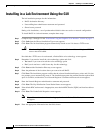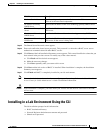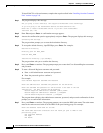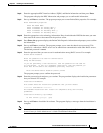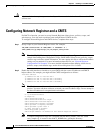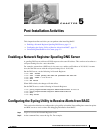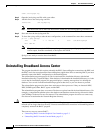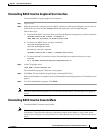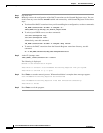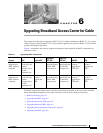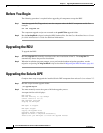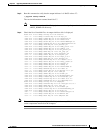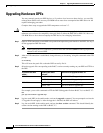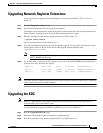
5-2
Cisco Broadband Access Center for Cable Installation Guide 2.7
OL-19105-01
Chapter 5 Post-Installation Activities
Uninstalling Broadband Access Center
touch /var/log/bpr.log
Step 3 Open the /etc/syslog.conf file with a text editor.
Step 4 Add this line to the /etc/syslog.conf file:
local6.info /var/log/bpr.log
Note You must insert one or more tabs between the local6:info and /var/log/bpr.log information.
Step 5 Save and close the /etc/syslog.conf file.
Step 6 To force the syslog utility to take the new configuration, at the command line enter these commands:
ps -ef | grep syslogd
root 217 1 0 Nov 26 ? 0:00 /usr/sbin/syslogd
kill -HUP 217
Note The pid in this example is 217, but may change when you run ps -ef | grep syslogd. Use the
correct output, from that command, as the input to kill -HUP.
Syslog is now ready to receive alerts from BACC.
Uninstalling Broadband Access Center
The program described in this section uninstalls the RDU, Network Registrar extensions, the DPE, and
the KDC, but it does not uninstall the Network Registrar application. Prior to removing BACC you must
manually remove the BACC configuration on Network Registrar.
The uninstallation program removes all files located under the installation directory (the default
installation directory is /opt/CSCObpr). If the database is found under the installation directory, as is the
case in the lab installation program, the program displays a warning message that it is deleting the
database. You can exit from the uninstallation program at that time, or you can choose to proceed.
The uninstallation program also shuts down and removes these processes if they are detected: RDU,
KDC, SNMP Agent, JRun, BACC agent, and the DPE.
The uninstallation program does not remove files that were placed outside the installation directory. For
example, a component installation places the database and database transaction logs directories under
/var/CSCObpr. So theses files are not removed. The uninstallation program also does not remove any
files that are located under the Network Registrar directory.
Caution If you uninstall BACC after configuring your Network Registrar servers to use BACC extensions, your
network will no longer function correctly. You must uninstall BACC extensions in Network Registrar to
completely uninstall the BACC program.
There are two ways to remove BACC:
• Uninstalling BACC from the Graphical User Interface, page 5-3
• Uninstalling BACC from the Console Mode, page 5-3



